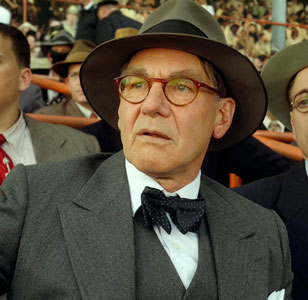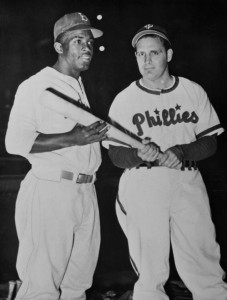Movies about sports don’t usually measure up to films that wind up getting Oscar buzz for being dramatic or memorable, but the movie “42” , chronicling Jackie Robinson’s signing with the Brooklyn Dodgers, is more than just a run-of-the-mill sports movie. It’s an honest portrayal of an important event in American history. Sports often mirror society and that was never more apparent than when Robinson began his journey as the first African American player to break baseball’s color line in 1947. The film includes some dramatic scenes chronicling the mental and physical abuse Robinson faced as he made history in his rookie season. The movie has an outstanding cast, with newcomer Chadwick Boseman playing Robinson, and perhaps the best performance in the film is Harrison Ford’s portrayal of Brooklyn Dodger general manager Branch Rickey.
Harrison Ford as Branch Rickey
Robinson faces prejudice from not only opposing teams and fans, but even his own teammates, who start a petition to keep from having to play on the same team with him. He is intentionally beaned in the head by a Pittsburgh pitcher and spiked in the calf purposely by Enos Slaughter. One of the most brutal scenes in the movie is when Phillies’ manager Ben Chapman, played by Alan Tudyk, comes out of the dugout and continuously heaps verbal abuse on Robinson when he’s at the plate. The scene is uncomfortable to even watch, yet the film’s producer says the language was actually cleaned up for the movie. Philadelphia’s team management winds up being criticized by sportswriters for Chapman’s behavior, so Chapman is ordered to pose with Robinson for a conciliatory photo to try and save face. Robinson relunctantly agrees to the photo, with some persuasion from Rickey, and Jackie suggests they pose holding a bat, “so we don’t have to touch skin.” The actual photo is below.
Jackie Robinson and Ben Chapman (actual photo)
The film has some light moments, such as the scene when Dodger pitcher Ralph Branca, played by Hamish Linklater, approaches Robinson after a game and asks why he always waits until the entire team is finished showering before he showers himself. Robinson explains that he doesn’t want to make anyone uncomfortable, but Branca tries to convince him that he shouldn’t feel that way. When he blurts out “c’mon, Jackie, shower with me”, he gets a laugh from Robinson and then tries to backtrack from the comment. Overall, the movie is uplifting, as Robinson’s Dodger teammates eventually come to respect him as a player and a man, and defend him in the beaning and spiking incidents. One of those teammates was Bobby Bragan, who I actually remember as a major league manager when I first started to follow baseball in the 1960s. Bragan storms into Rickey’s office and demands to be traded rather than play alongside Robinson, but after a week rescinds the demand. It’s not mentioned in the movie, but Bragan later was quoted as saying that he changed his mind because “after just one road trip, I saw the quality of Jackie the man and the player, and told Mr. Rickey I had changed my mind and I was honored to be a teammate of Jackie Robinson.” When Bragan attended Rickey’s funeral in 1965, he stated that he decided to attend because, “Branch Rickey made me a better man.” Those types of stories are the real legacy of what Robinson accomplished by running the gauntlet of racism during that initial season in major league baseball, and why his story is so much more than a sports biography. Robinson truly did change history.


internet page
September 6, 2013 at 1:19 pm
I enjoy a great movie or televison show like you. Follow my Blog so we can share our wonderful insites and communicate. Great job!!!
Silver Price
August 17, 2013 at 10:23 am
By the early 1970s Robinson was still pressing for more integration in sports, and most of all wanted to see a black manager in professional baseball. (In 1974 Frank Robinson became the first black major league manager, taking over the reins of the Cleveland Indians.) Robinson was specially honored in 1972, when he was asked to throw out the ball to open the second game of the 75th World Series at Riverfront Stadium in Cincinnati. Although still in his early 50s, Robinson was in shaky physical health by this time. He had survived one heart attack, and his body had suffered from years of diabetes and high blood pressure. Less than two weeks after his ceremonial toss at the World Series, he collapsed at his home in Connecticut and died later that day. His funeral at Riverside Church in New York City attracted more than 2,500 people, including many celebrities and political dignitaries. Thousands lined the streets as Robinson’s body was taken to Brooklyn for burial.
Chelsea O. Pugh
July 18, 2013 at 1:11 pm
And Robinson was a Dodger. If you’re a Dodgers fan, his fable belongs to you. There’s really no greater story in sports to share. For many, particularly in 1947 when he made his major league debut, Robinson was a reason to become a Dodger fan. For those who were born or made Dodgers fans independent of Robinson, he is the reward for years of suffering and the epitome of years of success.
Gracie Bray
July 2, 2013 at 5:32 pm
WHEN/ WHERE: Thursday, April 11, 2013 ¬— “42” Advance Screening Event at AMC BarryWoods 24, 8101 Roanridge Road, Kansas City, MO 64151 6:30 p.m. — Red Carpet VIP Reception with“42” stars Harrison Ford and Andre Holland 8:00 p.m. — “42” screening for VIP and Legacy ticketholders (see below) 8:10 p.m. — Multiple screenings of “42” for Major Leaguer ticketholders 9:30 p.m. — Q&A Panel Discussion, moderated by Joe Posnanski, former sports writer for the Kansas City Star and Sports Illustrated and author of “The Soul of Baseball: A Road Trip Through Buck O’Neil’s America.” Panel will feature, at minimum, Bob Kendrick, president of the Negro Leagues Baseball Museum, and David Robinson, the son of Jackie Robinson.
Denny Salazar
July 2, 2013 at 2:04 pm
The Hollywood buzz has started for the new movie 42, a look into the life of American baseball player Jackie Robinson — the first African American to play in Major League Baseball. And in just a few days, April 15 will mark the 64th anniversary of Jackie’s first MLB game at Ebbets Field as a Brooklyn Dodger, breaking the color barrier.
Chi Allison
June 30, 2013 at 1:01 pm
“42? was far more detailed and fleshed out than similar films about civil rights milestones in sports. I’m mostly comparing it to “Glory Road,” “Remember the Titans,” and “The Express,” the last of which was filmed right here at Northwestern University.
Warren Coleman
June 26, 2013 at 2:42 am
New Era is an international lifestyle brand with an authentic sports heritage that dates back over 90 years. Best known for being the official on-field cap for Major League Baseball, New Era was the producer of the very cap Jackie Robinson wore when he led the Brooklyn Dodgers to a World Series victory in 1955. Visit NewEraCap.com to shop the Authentic Collection for Major League Baseball.
Stacey E. Robles
June 19, 2013 at 10:44 pm
Former major leaguer Dmitri Young, who played 13 seasons with the Detroit Tigers, Cincinnati Reds, Washington Nationals and St. Louis Cardinals and now coaches kids in suburban Los Angeles, thinks young people today have no idea what Robinson endured. He hopes a movie like “42” can change that, and can show black kids that baseball is a great game to play.
Fernando Marshall
June 5, 2013 at 12:59 pm
The movie “42? is the story of Jackie Robinson, a baseball player who became the first African-American to play in Major League Baseball since the game was segregated in the 1890’s. Robinson broke the baseball color barrier when the Brooklyn Dodgers started him in April, 1947. He contributed to the civil right’s movement and paved the way for African-Americans to be accepted into professional sports. He went on to have a great ten year career in Major League Baseball and was later inducted into baseball’s Hall of Fame. Due to his time in the military and segration, Robinson did not play MLB until he was 28 years old. He missed some of the prime years of his career.
Boyd Hanson
May 22, 2013 at 2:16 am
Ostermueller did plunk Robinson … but only in the arm. A far cry from the temple shot Robinson suffers in the movie.